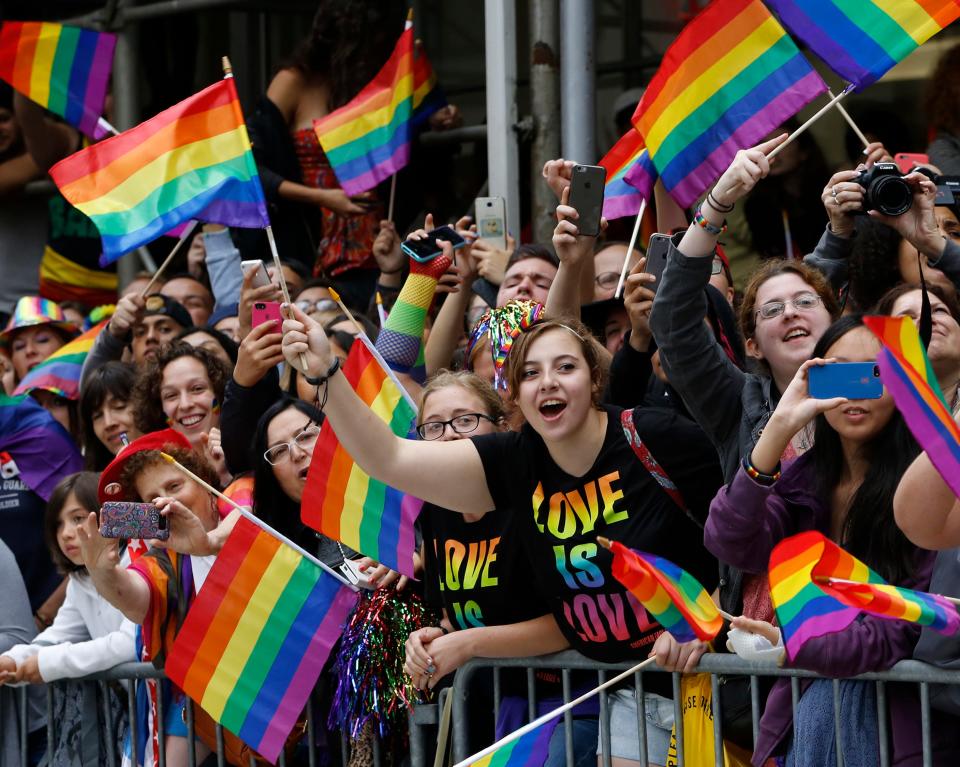We are Latinx: Why some Latinos have embraced a gender-neutral identity
To Edgar Gomez, hearing "Latinx" for the first time felt like discovering the movie "Selena," the biopic celebrated by many people who grew up torn between their Latin American heritage and their American identity: Gomez felt seen.
"Like that feeling of being represented accurately for the first time," said Gomez, who is nonbinary and uses the pronouns he, she or they. "That’s how I felt when I discovered the word Latinx. Like, 'Oh, finally someone found a way to reflect me.'"
Critics say Latinx is a made-up word forced on Latinos and Hispanics by progressive white people. They describe it as an appropriation of Spanish, a heavily gendered language where nouns are assigned masculine or feminine properties (a spoon is feminine, a fork is masculine).

But to Gomez, and many people of Latin American origin who use the term, it's a found missing puzzle piece, a way to signal to others community and shared values.
"It’s not just a white people word and, in fact, most white people I talk to aren't even aware of the word Latinx because it’s not something that has to do with them," said Gomez, whose memoir "High-Risk Homosexual" about growing up Nicaraguan arrived this month.
The term describes people of Latin American origin or descent. Generation Z and millennials are most likely to use it, as are people who are born in the United States, attended college, live on the East or West Coast or care about progressive issues, according to various surveys. They often speak English and Spanish or sometimes only English. They are likely to identify by their family's country of origin or by other pan-ethnic terms such as Hispanic, Latino, or Caribbean.
Many high-profile Latinos are increasingly championing Latinx identity. Pop stars Becky G and Shakira use Latinx. Political leaders Julián Castro and U.S. Rep. Alexandria Ocasio-Cortez refer to Latinx voters. Actors John Leguizamo, Camila Mendes, Indya Moore and Zoe Saldana have taken it up as well.

"It was meant to break the stereotype," said Veronique Medrano, a Mexican American country singer who lives in Texas and also identifies as Chicana and Latina.
Latinx resonates with Medrano as a term that acknowledges women and LGBTQ people and also challenges male-dominated traditions in Latin America.
"It is our term. It is for people who protested patriarchy, who wanted to be themselves without fitting into that mold, to feel like they can finally put a name to the otherness that they feel," she said.
Latinx emerged with feminist activists in the 1990s across Latin America and in the United States. More people learned of the term after a mass shooting killed many LBGTQ Hispanics at the Pulse nightclub in Orlando, Florida, in June 2016.

More recently, a favorite talking point against Latinx is that only 3% of Latinos use the term, a figure pulled from a Pew Research Center study published in August 2020. At the time, Republican and Democratic lawmakers were sparring over which political party truly understood the Hispanic community as President Joe Biden and his surrogates embraced Latinx.
The debate resurfaced in December when the Miami-based research firm Bendixen & Amandi International released a poll that showed only 2% of respondents used Latinx to describe their ethnicity. About 68% preferred Hispanic, and about 21% used Latino.
Shortly after, the Miami Herald editorial board published an anti-Latinx call to action titled "The 'Latinx community' doesn’t want to be called 'Latinx.' Just drop it, progressives." The article says "it's starting to look like the majority of people using Latinx are well-meaning non-Hispanics."
The president of the League of United Latin American Citizens, the oldest Latino civil rights group in the United States, directed his staff to no longer use Latinx, citing the Miami Herald editorial. The organization had uplifted the word before then, even hosting a State of Latinx America Summit.
But 3% of 62.1 million Hispanics adds up to nearly 2 million people, a population larger than that of Rhode Island, Hawaii and Wyoming. More Americans identify as Latinx than there are people who identify as Sikh, Peruvian, Cuban or Haitian. The group nearly equals the number of Muslim adults in the United States.
Ed Morales, the author of “Latinx: The New Force in American Politics and Culture” and a lecturer at Columbia University’s Center for the Study of Ethnicity and Race, selected the title of his 2018 book before realizing the backlash it would bring about. These days, he said “troll armies” attack him on the internet when he uses Latinx.
"It seems to me as a calculated attack on people who have more progressive views," he said. "I come from a working-class background. I’m not an elite leftist."
Latinx confronts “the anti-gay and the anti-women identity of Latin America,” Morales added. “Latinx is representing a new cultural hybrid that Latinos are creating in the United States.”

Mark Hugo Lopez, director of race and ethnicity research at the Pew Research Center, said the organization's findings on Latino identity have drawn an emotional response in the past, including its work in 2012 that found most people hailing from Latin America don't want to be known as Hispanic or Latino. They prefer to be known by their country of origin: Venezuelan, Cuban, Mexican, Brazilian and so on.
Pew hopes to revisit its Latinx research soon to better understand how people are learning about more inclusive gender identities. For example, Lopez said, he would like to ask people about Latine, a gender-neutral term growing in popularity in Latin America and in the United States as an alternative for Latinx, which some find hard to pronounce in Spanish.
"Maybe we are still in the early days of adaptation of a term like Latinx," Lopez said. "It remains to be seen what will happen as we move forward."
'We are constantly switching labels'
Some Latinx Americans wonder if the backlash against the term has been exaggerated.
G. Cristina Mora, a sociologist at the University of California, Berkeley, and the author of "Making Hispanics: How Activists, Bureaucrats, and Media Constructed a New American," calls herself Latinx, Latina, Chicana, Mexican or Hispanic.

“If you know anything about Latindidad, we are constantly switching labels,” Mora said.
Mora contributed to a survey of California Latinos in January 2020 who were born in the United States that found 50% of Generation Z respondents and 40% of millennials referred to themselves as Latinx.
“This is repeating history. If you think about when we had Black is beautiful, when we reclaimed Raza, when we said no we are not going to use Oriental. These have all been generational shifts about what we call ourselves,” she said.
Sarah Hannah Gómez, a senior editor at Kevin Anderson & Associates, a literary services firm, has used Latinx for years and provides her pronouns on her email signature. Gómez is half black and half white. She was adopted by a Chicano father and an Eastern European Jewish mother.
Latinx "is a way of indicating that you understand that gender is more complicated than just you are a girl or you are a boy,” she said.

To be as inclusive as possible, Michael Rodriguez-Muñiz, a sociology and Latino studies professor at Northwestern University in Illinois, uses Latinx, Latino and Hispanic while addressing his students.
"It feels funny when I hear that Latinx is elitist from persons or institutions that one could argue are elitist," he said.
'When I say Latinx I mean everybody'
Many people who use Latinx said they do so to acknowledge the diversity within the Latino community.
Rosa Parra co-founded the Latinx Lens podcast with a friend to celebrate Latino contributions to film. She first learned of the term as a Chicano studies student at the University of New Mexico about four years ago.
"To me, it just means when I say Latinx I mean everybody and not excluding anybody, including nonbinary people," Parra said.
Some listeners oppose the podcast's name, decrying a term they feel is often used by white-led corporations or non-Latinos.
"I don't think they have taken the time to sit down and talk to someone like me who utilizes the term," she said.

Frederick Luis Aldama, whose family is Irish, Guatemalan and Mexican, loved Latinx when he first learned of the term from his students. It acknowledged the complexity of his own cultural and geographic identities. The X reminded him of Professor X, who provides refuge for other X-Men in Marvel Comics. It also recalled Malcolm X, whose new identity denounced his slave name.
“There’s so much power for me in Latinx,” he said. “I just love that it feels fresh and new and future-looking.”
Aldama is the Jacob & Frances Sanger Mossiker Chair in the Humanities at the University of Texas at Austin, and is known as Professor Latinx by other comic book aficionados. His works include the book “Latinx Superheroes in Mainstream Comics” and “Latinographix,” a trade press that publishes graphic stories.
He said he gets attacked on social media whenever he brings up Latinx. And at Christmas, one of his cousins demanded to know why he used Latinx.
“I was like, ‘Why are you so fired up?’" Aldama said. “He was like, ‘You are destroying the language!”
Latinx is 'radical,' proponents claim
Some people who use Latinx have debated whether to use the word with other Latinos, especially older people who might push back against the term.
When she was growing up, Yadira Sanchez's parents taught her she was Chicana because she was born in the United States. More recently, as she became more involved with progressive activism, Sanchez, co-executive director of Poder Latinx, a national voting group, learned of the term Latinx. She didn't like the word at first, because she had never heard it before. Soon, however, she realized it was the best term to reach the young voters who share her values when it comes to immigration reform, climate justice and economic reforms.
"We definitely knew if we wanted to be speaking to the future generations, we had to be using Latinx," she said. "We see it as acknowledging the diverse identities in our community: Latinos, LGBTQ, Afro-Latinos, folks that are nongender binary. We see it as a progressive term, folks that are aligned with our values, that want change, that want equality for all people."

Sanchez uses the term Latino when speaking to older generations and Spanish-language media.
Ethan Coston, a recent college graduate and a journalist in Pennsylvania who is half-white and half-Mexican, sometimes debates not using Latinx in his journalism to avoid turning off people who don’t use the term. Ultimately, he has opted to use Latinx in his writing to be inclusive.
“It can refer to everyone,” he said.
Gomez, the memoirist, said they don't mind upsetting people by using Latinx.
They said they enjoy challenging Spanish dominance in Latino culture, a language they associate with Spain and not their Native American ancestors.
“It is a language that was forced on one half on my ancestors by the other half of my ancestors so I find it radical ... to not have this loyalty to this colonizer language,” Gomez said. “It is the most anti-white thing you can do."

Some Hispanics opposed to Latinx are not ready to acknowledge LGBTQ Latinos and Gomez isn't waiting for their approval, they said.
Said Gomez: "They don't want to make space for us."
Follow Cristina Silva on Twitter at @cristymsilva.
This article originally appeared on USA TODAY: 'Latinx' embraced by Latinos seeking gender-neutral identity

 money
money 